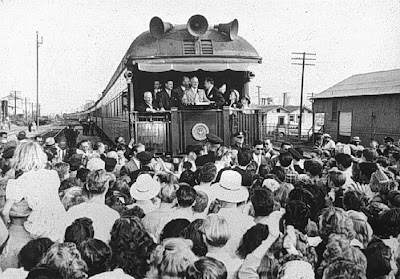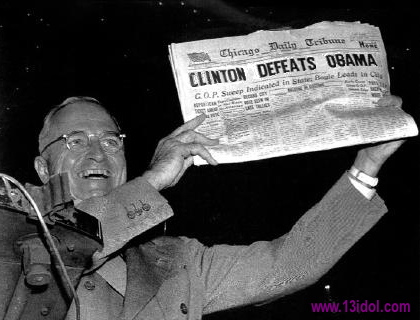Let me give some more information on the American political lexicon. The greatest "hero" of the era of the common man was David Crockett, known invariably to Americans as Davey Crockett, a name he loathed. He wanted to be seen as a gentleman (something he never remotely approached), and was very much the dandy in his style of dress--wearing buckskins in the backwoods was not going to impress voters the majority of whom wore buckskin from necessity. He was one of Jackson's veterans of the Creek War, and a major in the militia, and he was able to get elected to the Tennessee legislature, where he was the despair of the Democrats, as he routinely championed causes in which the voters were not interested and the Democrats opposed. He was, however, one of Americans great political campaigners, and that lead him to win two terms in the United States House of Representatives, where he made himself just as odious to the Democrats as he had in the Tennessee legislature. After an unsuccessful attempt to financially exploit his newly found popularity as a backwoodsman (he actually wore buckskins in public, something he would never have dreamed of doing just a few years earlier), he returned to Tennessee, and soon ran for a third term in the House. The voters had long since been disabused of their illusions about him, though, and this time he lost. He had said that if he were not elected, the voters could go to Hell and he would go to Texas. He lost, and he wandered off to Arkansas, and eventually to Texas, where he managed to get himself killed at the Battle of the Alamo.
But Crockett had been a master of the "stump speech." On the western frontiers of the republic, settlements were so new that the stumps of the trees which had been felled to make a clearing for the town were still in evidence years later. Political candidates who were opponents would travel together, and arriving in a small settlement, would stand on a stump to address the crowd. So the standard, folksy, "I'm just a regular guy" speech of a political candidate has become known as a stump speech, something that Crockett was so good at that he won two terms in the House despite being a political disaster for his constituents.
Later, when candidates realized there was something a little sleazy about the opposing candidate traveling together to deliver their speeches, a new method was adopted. The candidate would arrive, and a stage would be erected where the candidate would "debate" an alleged opponent, who was actually a member of his own organization. Obviously, it was the job of the "opponent" to deliver a clumsy caricature of the opposing party's program, which the candidate could easily deride. The policies of a party became known as their "platform," and the individual aspects of the party's agenda became known as the "planks" of the "party platform."
Later still, when the nation had been crisscrossed with railroads, candidates wishing to appeal directly to the electorate would hire a special train, and the railroad companies would arrange their schedules conveniently for their travel (and at a hefty fee). The train would pull into a small town, and the candidate would address the crowd from the back of his special car. Since many small towns were not a regular stop on the railroad schedule, they would have a whistle which they blew to alert a train that they had passengers or freight to load. So the really small towns became known as whistle-stops, and the technique of running a popular campaign by going out to speak to the public has become known as a "whistle-stop campaign." Theodore Roosevelt, Jr. was one of the greatest whistle-stop campaigners. In his day, in the 1880s and -90s, presidential candidates did not campaign publicly themselves, it being seen as beneath their dignity--so surrogates would campaign for them, and Roosevelt was the greatest of these. When he ran for president himself in 1904, he broke to old taboo, and went out "whistle-stopping" himself--and won the greatest plurality in any contested election in our history.
Probably the most famous whistle-stop campaign of modern times was that of Harry Truman in 1948. Below is an image of Truman addressing a crowd from the back of his special car:

The newspaper pundits were confidently predicting that Truman would be defeated by his Republican opponent, Thomas Dewey, then governor of New York. Truman's aides advised him to give up the prepared speeches, and to "whistle-stop" to deliver "stump speeches," in the course of which he would outline the "planks" which made up his "platform." The newspaper editors were so confident that Dewey would defeat Truman, that before retiring for the night on election day, they had headlines set up proclaiming Dewey's victory over Truman. Truman, in a squeaker, won just a fraction of a percentage point below 50% of the vote, but he won a landslide in the electoral college. This lead to what is arguably the most famous photograph in American political history:

Truman is holding up a copy of the
Chicago Daily Tribune with it's headline claiming Dewey had defeated Truman, on the morning after the election which Truman had won. This image has become so well known in the American political scene, that it is used in other contexts:

Here, it is used to make fun of those who claimed Hillary Clinton would easily defeat Mr. Obama for the Democratic nomination.

Here it was used with a headline which read: "McCain defeats McCain" suggesting that in supporting Mr. Bush's $700+ billion bailout package, McCain was being his own worst enemy.
If i think of anything else in the way of political Americana, i'll post it.